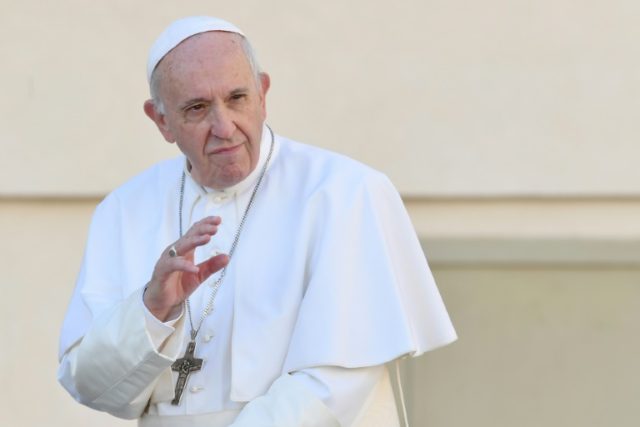Pope Francis has urged the United States bishops to stop pointing fingers at one another over clerical sex abuse and, instead, unite in a common effort forward.
In a letter to the U.S. bishops gathered in retreat this week, the pope said that “times of trial and tribulation can threaten our fraternal communion” and insisted that the bishops regain lost credibility, which is “the fruit of a united body.”
As many bishops have called for investigations into the serial homosexual abuse of former Cardinal Theodore McCarrick, including who enabled his rise through the clerical ranks and who benefited from his patronage, the pope called on his brother bishops to “abandon a modus operandi of disparaging, discrediting, playing the victim or the scold in our relationships, and instead to make room for the gentle breeze that the gospel alone can offer.”
“Let us try to break the vicious circle of recrimination, undercutting and discrediting,” Francis said in the letter released Thursday, “by avoiding gossip and slander in the pursuit of a path of prayerful and contrite acceptance of our limitations and sins, and the promotion of dialogue, discussion and discernment.”
For this to happen, he said, we must “stop projecting onto others our own confusion and discontent, which are obstacles to unity.”
“We have to be careful that the cure does not become worse than the disease,” he said.
In the letter, the pope acknowledged that “the Church in the United States has been shaken by various scandals that have gravely affected its credibility” and that its credibility has been seriously undercut “even more by the efforts made to deny or conceal them.”
“As we know, the mentality that would cover things up, far from helping to resolve conflicts, enabled them to fester and cause even greater harm to the network of relationships that today we are called to heal and restore,” he said.
“The hurt caused by these sins and crimes has also deeply affected the communion of bishops,” Francis said, and generated “division and dispersion.”
God’s faithful people continue to suffer greatly as a result of the abuse, he said, “as well as the pain of seeing an episcopate lacking in unity and concentrated more on pointing fingers than on seeking paths of reconciliation.”
“Dear brothers, the Lord was well aware that, at the hour of the cross, lack of unity, division and dispersion, as well as attempts to flee from that hour, would be the greatest temptation faced by his disciples—attitudes that would distort and hinder their mission,” he said.
The pope’s emphasis on recovering lost unity among the episcopate rather than on accountability and transparency will leave some observers wondering how serious the pope is about getting to the bottom of the sex abuse problem.
In his letter, the pontiff fails to challenge the bishops to a serious examination of conscience to discover what went wrong, how it was able to happen, and what can and must be done about it.
In the wake of revelations of decades of abuse by Cardinal McCarrick, Pope Francis wrote a similar letter last August addressed to “the people of God,” acknowledging the scandals but side-stepping the root causes of the crisis as well as the practical steps needed to correct it.
While insisting that “no effort must be spared to create a culture able to prevent such situations from happening, but also to prevent the possibility of their being covered up and perpetuated,” the pope failed to propose that those responsible for the situation should be held to any accountability.
While a number of prelates, priests, and laypeople have insisted on the need for straightforward and honest recognition of the extensive “homosexual subculture” that exists among bishops and clergy and that lies at the root of the abuse crisis, Pope Francis has chosen not to address the question of homosexuality in the clergy and its fallout.
During the past months, many Catholics have stepped forward to denounce the widespread and tacitly accepted homosexual activity of priests and prelates that coincided with networks of abuse, whose victims are overwhelmingly male.
In late August, a former papal nuncio to the United States released a bombshell report accusing the pope himself of being negligent in dealing with clerical sex abuse, alleging that the pontiff had known about Cardinal McCarrick’s crimes since 2013 and yet reinstated him to a position of power and influence in the Vatican.
When asked about the truth of these allegations, Pope Francis has held to a strategy of silence, comparing his accuser to the devil.
Follow Thomas D. Williams on Twitter Follow @tdwilliamsrome

COMMENTS
Please let us know if you're having issues with commenting.